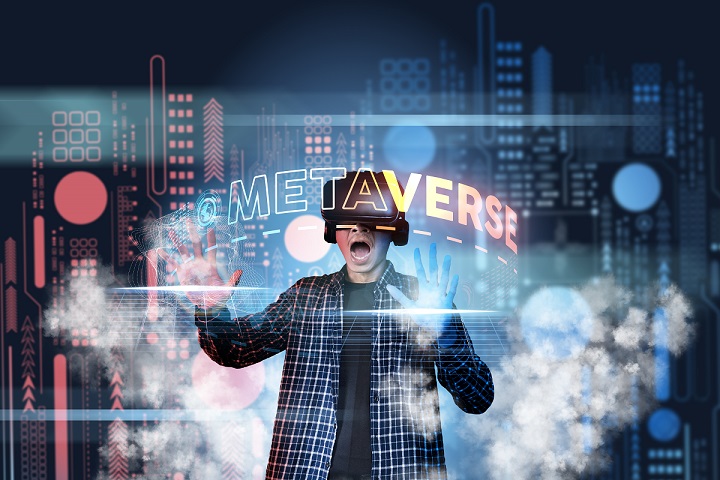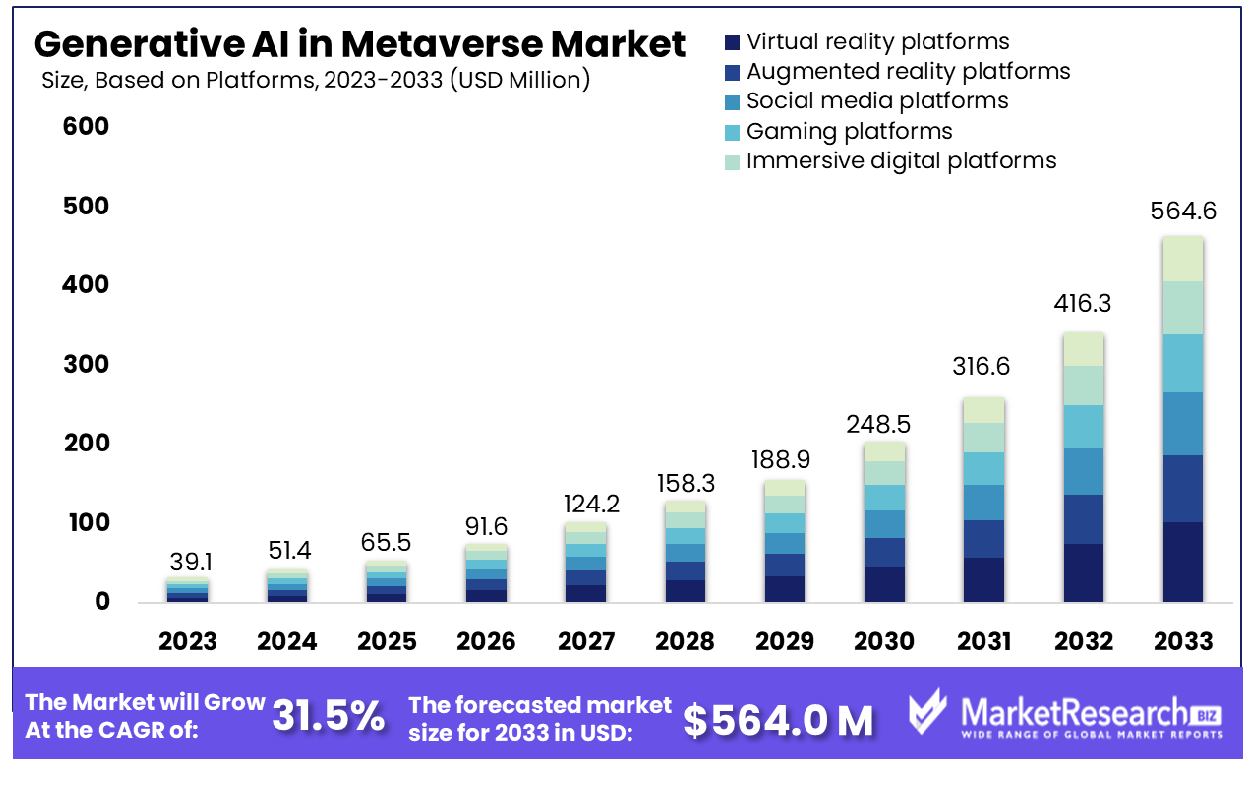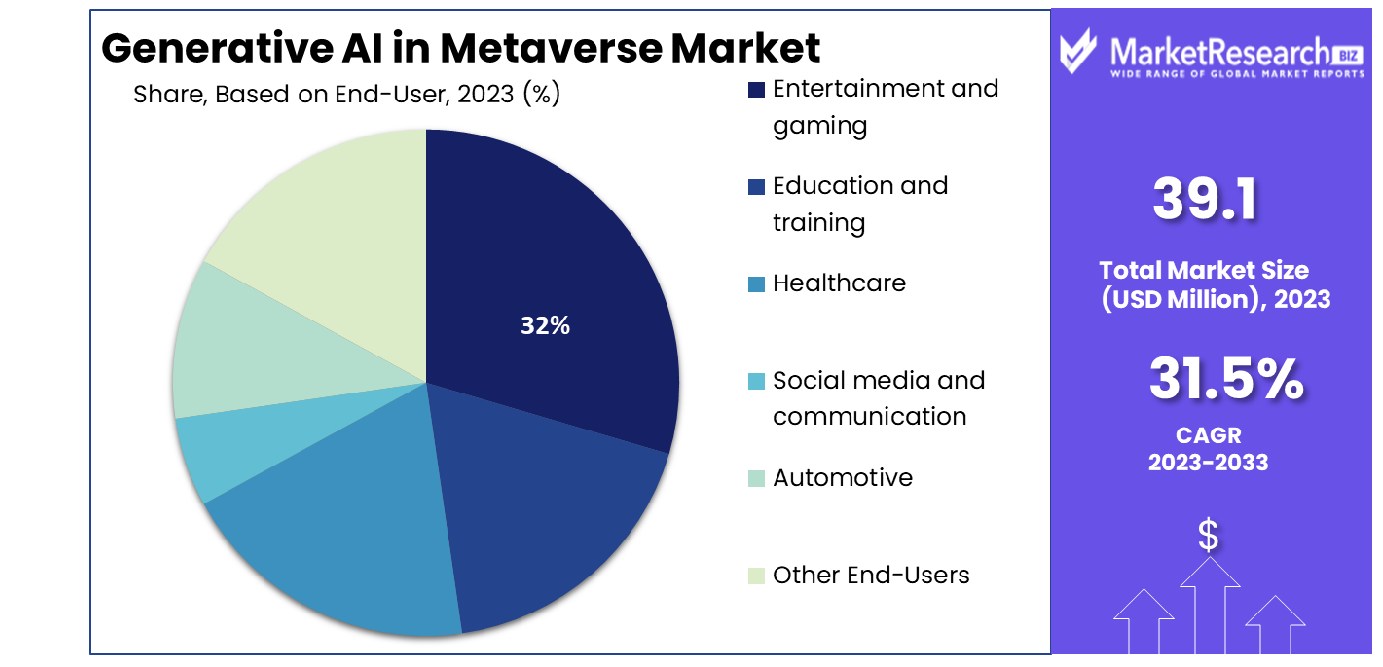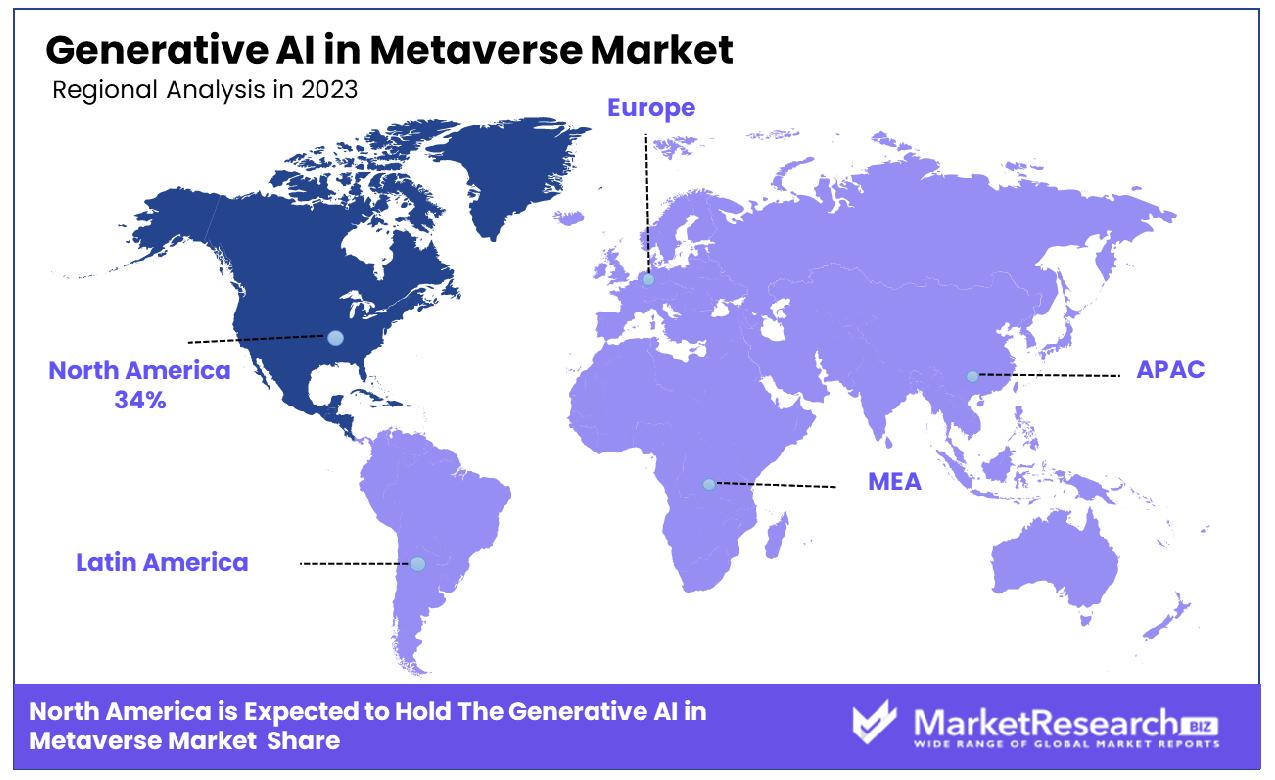
Generative AI in Metaverse Market Based on Platforms(Virtual reality platforms, Augmented reality platforms, Social media platforms, Other Platforms), Based on Functionality(Procedural content generation, AI-driven character and object creation, Other Functionalities), Based on End-User(Entertainment and gaming, Education and training, Other End-Users) By Region And Companies - Industry Segment Outlook, Market Assessment, Competition Scenario, Trends, And Forecast 2024-2033
-
39046
-
April 2024
-
300
-
-
This report was compiled by Vishwa Gaul Vishwa is an experienced market research and consulting professional with over 8 years of expertise in the ICT industry, contributing to over 700 reports across telecommunications, software, hardware, and digital solutions. Correspondence Team Lead- ICT Linkedin | Detailed Market research Methodology Our methodology involves a mix of primary research, including interviews with leading mental health experts, and secondary research from reputable medical journals and databases. View Detailed Methodology Page
-
Quick Navigation
Report Overview
The Generative AI in Metaverse Market was valued at USD 39.1 million in 2023. It is expected to reach USD 564.6 million by 2033, with a CAGR of 31.5% during the forecast period from 2024 to 2033.
The surge in demand for new advanced technologies and extensive utilization of the internet and digital platforms are some of the main driving factors for the generative AI in the Metaverse market. Generative AI plays a vital role in creating an effective Metaverse experience. GenAI is the common form of artificial intelligence that has the latest technological innovations. It supports the automatic generation of new content like video, images, and text.

The implementation of generative AI in Metaverse got a lot of attention. GenAI offers a new and selective way of producing unique content in the Metaverse. For example, ChatGPT enhances the search experience, transforms the style of generating and showcasing the data, and opens new ways and methods for gaining online traffic. It could also affect old solutions in the Metaverse alongside hastening new innovations in the industry.
Metaverse technology signifies an open and insistent 3D objects world, which connects the gap between the virtual and physical/tangible worlds. Some of the individuals have also briefed Metaverse as a three-dimensional version of the internet. The Metaverse comprises a different amalgamation of technologies, that includes physical, virtual, and combined reality, in the shared online platform.
According to a report published by Meta on May 2023, as per a research, US is well placed to harness the capability of the Metaverse and can lead to global development which will bring a substantial advantage to the US economy and could give between USD 402 billion and USD 760 billion in yearly GDP by 2035. US firms are using digital twins to enhance the structure of objects before producing by providing much capacity to save time and money for the business.
Moreover, the EU has much higher rates of business implementation for advanced technologies such as AR and VR with a 10% rate in the EU which is higher in comparison to the 9% rate in the US. As per another research, the successful development of Metaverse will contribute an extra Euro 259 to 489 billion euros annually to the country’s GDP by 2035.
Generative AI in Metaverse has many benefits such as it has instinctive interfaces, digital humans that are quite similar to the AI-enabled non-playing characters in video games, precision in creating the avatars, boosting VR worlds, and eliminating the language hurdle. The demand for generative AI in Metaverse will rapidly grow due to a surge in digital platforms, video games, and internet usage that will help in market expansion in the coming years.
Key Takeaways
- Market Growth: The Generative AI in Metaverse Market was valued at USD 39.1 million in 2023. It is expected to reach USD 564.6 million by 2033, with a CAGR of 31.5% during the forecast period from 2024 to 2033.
- Based on Platforms: Virtual reality platforms command 31% of the market, signifying immersive experience demand.
- Based on Functionality: Procedural content generation leads functionality at 33%, indicating AI's creative capability embrace.
- Based on End-User: Entertainment and gaming dominate end-users with 32%, showcasing interactive content's appeal.
- Regional Dominance: North America holds a 34% share in the Generative AI Metaverse Market.
- Growth Opportunity: Generative AI revolutionizes real estate by enhancing property visualization and transforming retail through personalized, interactive virtual shopping experiences, optimizing customer engagement and satisfaction in both sectors.
Driving factors
The Surge in Consumer Demand for Immersive Experiences
The growth of Generative AI in the Metaverse Market is significantly driven by the increasing consumer demand for immersive and engaging digital experiences. As digital natives become a larger portion of the consumer base, the expectation for sophisticated, interactive online environments has risen. This shift has led to a greater acceptance and desire for metaverse experiences that offer rich, immersive digital worlds. These virtual spaces, powered by Generative AI, enable users to experience highly personalized and engaging content that adapts in real time, thereby enhancing user engagement and satisfaction. The demand for such immersive experiences is not just a trend but a pivotal factor shaping the future of digital interactions, driving continuous investment and innovation in the metaverse space.
Integration of VR and AR Technologies
The adoption of Virtual Reality (VR) and Augmented Reality (AR) platforms plays a crucial role in catalyzing the growth of Generative AI in Metaverse Market. VR and AR technologies are the backbone of creating deeply immersive and interactive virtual environments, allowing users to experience a seamless blend of digital and physical worlds.
These technologies, coupled with Generative AI, enhance the realism and interactivity of the metaverse, making virtual experiences more engaging and lifelike. As hardware becomes more accessible and content more diverse, the integration of VR and AR with Generative AI is set to expand the boundaries of what's possible in the metaverse, attracting more users and developers to the ecosystem.
Cloud Innovation: Enabling AI Evolution
The innovation in cloud storage and computing has a transformative impact on the Generative AI in Metaverse Market. Cloud technology has democratized access to powerful computing resources, essential for running the complex algorithms of Generative AI and processing vast amounts of data in real time. This has made it feasible for companies of all sizes to participate in the development of the metaverse, fostering a culture of innovation and collaboration.
Moreover, cloud platforms facilitate the evolution of AI and deep learning by providing the infrastructure necessary for continuous improvement and scaling of AI models. This not only accelerates the pace of innovation in Generative AI but also ensures that these advancements are readily accessible, thus driving the expansion and sophistication of metaverse environments.
Restraining Factors
Financial Barriers: Initial Investment and Maintenance Costs
High initial investment and maintenance costs for implementing Generative AI technologies represent a significant barrier to the growth of Generative AI in the Metaverse Market. Developing, deploying, and maintaining Generative AI systems require substantial financial resources, not only for the acquisition of sophisticated hardware and software but also for hiring skilled professionals capable of managing these complex systems.
Small and medium-sized enterprises (SMEs), in particular, may find these costs prohibitive, limiting the adoption of Generative AI within the metaverse to larger corporations with the necessary capital. Furthermore, the ongoing expense associated with updating and refining AI models to keep them effective and secure adds an additional layer of financial burden. These costs can deter continuous investment in Generative AI technologies, potentially slowing the pace of innovation and expansion within the metaverse ecosystem.
Educational Gaps: Understanding Generative AI
A limited understanding and knowledge of Generative AI technology among end-users also pose a challenge to the expansion of Generative AI in Metaverse Market. The complexity of Generative AI systems and their underlying technologies can be daunting for users without a technical background, affecting their willingness to engage with and invest in these systems.
The lack of awareness and understanding can lead to underutilization of the technology's full capabilities, hindering the realization of its potential benefits in creating more immersive, interactive, and personalized metaverse experiences. To mitigate this issue, there is a critical need for comprehensive educational programs and user-friendly interfaces that demystify Generative AI for the average user, thereby fostering a broader acceptance and adoption of these technologies within the metaverse.
By Platform Analysis
Virtual reality platforms command a significant 31% share in the Generative AI Metaverse Market.
In 2023, Virtual Reality platforms held a dominant market position in the "Based on Platforms" segment of the Generative AI in Metaverse Market, capturing more than a 31% share. This prominence can be attributed to the immersive experience these platforms provide, making them a preferred choice for both consumers and developers in the burgeoning field of generative AI applications within the metaverse.
Following closely, Augmented Reality platforms secured a significant portion of the market, demonstrating their growing influence in enhancing real-world environments with digital overlays, thus offering unique user experiences. Social Media platforms also played a pivotal role, leveraging generative AI to offer personalized content creation and interaction, thereby increasing engagement within virtual communities.
Gaming platforms, known for their early adoption of cutting-edge technologies, utilized generative AI to create dynamic, responsive environments and characters, contributing to an enriched, immersive gaming experience. This adoption underscores the platforms’ commitment to innovation and enhancing user engagement.
Immersive Digital platforms, although a broader category, have shown remarkable potential in utilizing generative AI to create fully immersive digital experiences across various industries, from retail to education, indicating a shift towards more interactive and engaging digital environments.
Other Platforms, encompassing a diverse range of emerging and niche platforms, have begun to explore the capabilities of generative AI, indicating the technology's versatility and its potential to revolutionize a wide array of virtual experiences.
By Functionality Analysis
Procedural content generation leads with a 33% stake, driving creativity in the metaverse landscape.
In 2023, Procedural content generation held a dominant market position in the "Based on Functionality" segment of the Generative AI in Metaverse Market, capturing more than a 33% share. This method, pivotal in automatically creating vast and diverse digital landscapes, demonstrates its critical role in scaling environments and enhancing the depth of virtual worlds, thereby attracting developers and users alike for its efficiency and innovation.
Following this, AI-driven character and object creation accounted for a significant market share, emphasizing the importance of dynamic, realistic entities within the metaverse. This functionality not only enriches the user experience by providing a diverse range of interactions but also underscores the technological advancements in creating highly detailed and responsive virtual inhabitants.
Natural Language Processing (NLP) for virtual interactions emerged as a key functionality, facilitating seamless and intuitive communication between users and the virtual environment. This capability enhances the immersion and realism of virtual experiences, making them more accessible and engaging.
Intelligent Virtual Assistants, leveraging generative AI, have become indispensable in providing user support and navigation, thereby enhancing the overall usability and accessibility of the metaverse platforms.
Personalized experiences, tailored to individual user preferences and behaviors, demonstrated the potential of generative AI in creating unique, engaging content and interactions. This functionality signifies a shift towards more user-centric virtual environments.
Other Functionalities, which encompass an assortment of cutting-edge applications and services, showcase the vast potential of Generative AI for revolutionizing how users engage with and experience the metaverse.
By End-User Analysis
Entertainment and gaming dominate, holding a 32% portion, underscoring their pivotal role in adoption.
In 2023, Entertainment and Gaming held a dominant market position in the "Based on End-User" segment of the Generative AI in Metaverse Market, capturing more than a 32% share. This segment's preeminence can be attributed to the immersive and interactive experiences that generative AI facilitates, revolutionizing gameplay and content creation. The ability to generate dynamic environments and characters in real time significantly enhances user engagement and offers personalized gaming experiences, establishing this sector as a pioneering force in adopting generative AI technologies.
Education and Training followed closely, leveraging generative AI to create realistic simulations and interactive learning environments. This application of generative AI in metaverse platforms exemplifies the potential for transformative educational experiences, making complex concepts more accessible and engaging through virtual immersion.
The Healthcare sector has also seen promising applications of generative AI, particularly in creating virtual scenarios for training medical professionals and enhancing patient care through innovative treatment planning and support tools.
Social Media and Communication platforms have utilized generative AI to foster more engaging and personalized interactions among users, demonstrating the technology's versatility in enhancing social connectivity within virtual spaces.
In the Automotive industry, generative AI has been instrumental in designing and testing virtual prototypes, significantly reducing development time and costs while allowing for more innovative design processes.
Other end users, including various emerging and niche sectors, have begun exploring the capabilities of generative AI within the metaverse, indicating a broad and growing interest across industries in harnessing this technology to create more immersive, interactive, and personalized virtual experiences.

Key Market Segments
Based on Platforms
- Virtual reality platforms
- Augmented reality platforms
- Social media platforms
- Gaming platforms
- Immersive digital platforms
- Other Platforms
Based on Functionality
- Procedural content generation
- AI-driven character and object creation
- Natural language processing for virtual interactions
- Intelligent virtual assistants
- Personalized experiences
- Other Functionalities
Based on End-User
- Entertainment and gaming
- Education and training
- Healthcare
- Social media and communication
- Automotive
- Other End-Users
Growth Opportunity
Real Estate and Architecture: Revolutionizing Property Visualization with Generative AI
The integration of generative AI within the real estate and architecture sectors marks a significant leap forward in how properties are presented, designed, and experienced. This technology's application in creating virtual tours, architectural visualization, and space planning is set to transform the industry. Virtual tours enabled by generative AI offer prospective buyers and tenants a deeply immersive exploration of properties, transcending the limitations of physical distance and static imagery.
Architectural visualization benefits from unprecedented realism and detail, allowing for a comprehensive understanding of a project's aesthetic and functional attributes before its actual construction. Additionally, space planning leverages AI's capability to optimize layouts and designs in real time, accommodating the specific needs and preferences of users. This technological evolution not only enhances the efficiency and effectiveness of the design and marketing processes but also elevates the user experience to new heights, offering a more profound and interactive understanding of spatial contexts.
Retail and E-commerce: Personalizing Shopping with Generative AI
The retail and e-commerce industries are witnessing a transformative change with the adoption of generative AI, enabling the creation of virtual shopping experiences that are both highly personalized and interactive. This technology's potential to generate virtual stores presents a unique opportunity for brands to engage customers in a novel and immersive shopping environment. By simulating virtual try-on experiences, generative AI allows consumers to visualize products in a highly realistic manner, tailored to their personal preferences and specifications.
Furthermore, the application of AI in product recommendation engines enhances the shopping experience by offering curated selections based on individual customer data, improving satisfaction and loyalty. The adoption of generative AI in retail and e-commerce not only enriches the customer experience but also offers retailers innovative tools for engagement, customization, and sales enhancement.
Latest Trends
AI-driven Character and Object Creation: Enriching the Metaverse Experience
In 2023, the global Generative AI in the Metaverse market witnessed a significant trend toward AI-driven character and object creation. This innovation has introduced a new level of realism and engagement within virtual environments. By leveraging generative AI technologies, developers are now capable of producing characters and objects that not only exhibit unprecedented detail and complexity but also demonstrate behaviors and interactions that closely mimic real-life entities. This advancement in character and object creation enhances user immersion, making virtual worlds more compelling and interactive.
The implications for storytelling, gaming, and social interactions within the metaverse are profound, as these AI-generated entities can adapt and respond in dynamically evolving scenarios, offering personalized experiences to users. This trend signifies a pivotal shift in how virtual content is created and experienced, promising to expand the boundaries of virtual worlds and user engagement therein.
Natural Language Processing for Virtual Interactions: Humanizing Communication in the Metaverse
The integration of Natural Language Processing (NLP) with Generative AI for virtual interactions emerged as a groundbreaking trend in the Metaverse market in 2023. This technology enables more nuanced and human-like communication within virtual spaces, overcoming the limitations of pre-scripted interactions. Through NLP, avatars and AI-driven characters can understand and generate human language models in real-time, facilitating organic conversations and interactions.
This level of communication proficiency enhances the social aspect of the metaverse, making it a more accessible and attractive platform for a wider audience. It also opens up new avenues for education, entertainment, and collaborative work within these virtual spaces. By humanizing interactions in the metaverse, NLP is not just improving user experience but also setting a new standard for the complexity and depth of virtual environments. This trend underscores the evolving capabilities of generative AI and its potential to make the metaverse an integral part of daily life, bridging the gap between virtual and physical realities.
Regional Analysis
North America dominates 34% of the Generative AI in the Metaverse market, leading in innovation and adoption.
In the rapidly evolving Generative AI in Metaverse market, regional dynamics play a crucial role in shaping the landscape. North America emerges as the dominating region, holding a substantial 34% market share. This prominence can be attributed to the region's robust technological infrastructure, significant investments in AI and VR technologies, and a strong presence of leading tech companies. The market in North America is characterized by high adoption rates of generative AI applications across various sectors, including entertainment, education, and retail, driving innovation and growth.
Europe follows, with a notable emphasis on privacy and ethical standards governing AI development and application. The region's market is propelled by collaborative efforts between governments, tech enterprises, and research institutions, fostering advancements in generative AI that enhance user experiences in the Metaverse while adhering to regulatory requirements.
The Asia Pacific region is identified as a rapidly growing market, driven by its vast consumer base and escalating digital transformation. Countries like China, South Korea, and Japan are at the forefront, investing heavily in AI research and metaverse platforms, aiming to leverage these technologies in gaming, social media, and e-commerce.
The Middle East & Africa and Latin America regions, though nascent, are experiencing growth in the Generative AI in Metaverse market. These areas benefit from increasing internet penetration and a young demographic eager to explore new virtual experiences. Investments in digital infrastructure and a growing interest in virtual applications for education and commerce are expected to fuel market expansion in these regions.

Key Regions and Countries
North America
- The US
- Canada
- Rest of North America
Europe
- Germany
- France
- The UK
- Spain
- Netherlands
- Russia
- Italy
- Rest of Europe
Asia-Pacific
- China
- Japan
- Singapore
- Thailand
- South Korea
- Vietnam
- India
- New Zealand
- Rest of Asia Pacific
Latin America
- Mexico
- Brazil
- Rest of Latin America
Middle East & Africa
- Saudi Arabia
- South Africa
- UAE
- Rest of Middle East & Africa
Key Players Analysis
In 2023, the global Generative AI in Metaverse market witnessed significant contributions from a roster of key players, each bringing distinct innovations and strategic approaches to the forefront. NVIDIA Corporation continued to be pivotal, leveraging its advanced GPU technologies to enhance AI-driven graphics and simulations in the Metaverse, offering developers the tools to create increasingly realistic virtual environments.
OpenAI, with its cutting-edge research in generative AI models, played a crucial role in evolving natural language processing and creative content generation, broadening the scope of interactions and content creation within the Metaverse.
Unity Technologies and Epic Games, renowned for their powerful game development platforms, Unity and Unreal Engine respectively, have been instrumental in democratizing Metaverse development. By integrating generative AI capabilities into their platforms, they've enabled creators to design complex, interactive virtual worlds with greater efficiency and realism.
Microsoft Corporation and Facebook Reality Labs (now Meta Platforms Inc.) have significantly influenced the market through their investments in cloud infrastructure and virtual reality (VR), respectively, fostering environments where generative AI can thrive in creating immersive experiences.
Alphabet Inc. (Google) and IBM Corporation have contributed through their vast resources in AI research and cloud computing, supporting the infrastructure needs of the Metaverse and advancing AI algorithms that drive personalization and realism. Emerging players like Magic Leap and Adobe Inc. have focused on niche areas of spatial computing and creative software, adding layers of interactivity and design sophistication to the Metaverse.
The landscape of the Generative AI in Metaverse market in 2023 is a testament to the collaborative and competitive spirit of these key companies. Their innovations not only drive the market forward but also shape the foundational technologies that define the Metaverse experience. As the market continues to evolve, the role of these players remains crucial in navigating the challenges and opportunities that lie ahead in creating a seamless and engaging virtual future.
Market Key Players
- NVIDIA Corporation
- OpenAI
- Unity Technologies
- Epic Games
- Microsoft Corporation
- Facebook Reality Labs (Meta Platforms Inc.)
- Alphabet Inc. (Google)
- IBM Corporation
- Magic Leap
- Adobe Inc.
- Other Key Players
Recent Development
- In March 2024, Deloitte's report highlights the U.S. Department of Defense's Defense Innovation Unit's adoption of novel transaction authorities to streamline tech procurement, showcasing significant advancements in government agility and efficiency.
- In March 2024, IBM and Anaconda collaborate to offer an enterprise-grade Generative AI solution via watsonx.ai, enhancing AI adoption with secure, open-source Python packages for data science.
- In January 2024, The European Commission and G7 emphasize adapting IP laws and competition regulations for AI and the Metaverse, aiming for ethical standards and innovation in the digital economy.
Report Scope
Report Features Description Market Value (2023) USD 39.1 Million Forecast Revenue (2033) USD 564.6 Million CAGR (2024-2032) 31.5% Base Year for Estimation 2023 Historic Period 2016-2023 Forecast Period 2024-2033 Report Coverage Revenue Forecast, Market Dynamics, COVID-19 Impact, Competitive Landscape, Recent Developments Segments Covered Based on Platforms(Virtual reality platforms, Augmented reality platforms, Social media platforms, Gaming platforms, Immersive digital platforms, Other Platforms), Based on Functionality(Procedural content generation, AI-driven character and object creation, Natural language processing for virtual interactions, Intelligent virtual assistants, Personalized experiences, Other Functionalities), Based on End-User(Entertainment and gaming, Education and training, Healthcare, Social media and communication, Automotive, Other End-Users) Regional Analysis North America - The US, Canada, Rest of North America, Europe - Germany, France, The UK, Spain, Italy, Russia, Netherlands, Rest of Europe, Asia-Pacific - China, Japan, South Korea, India, New Zealand, Singapore, Thailand, Vietnam, Rest of Asia Pacific, Latin America - Brazil, Mexico, Rest of Latin America, Middle East & Africa - South Africa, Saudi Arabia, UAE, Rest of Middle East & Africa Competitive Landscape NVIDIA Corporation, OpenAI, Unity Technologies, Epic Games, Microsoft Corporation, Facebook Reality Labs (Meta Platforms Inc.), Alphabet Inc. (Google), IBM Corporation, Magic Leap, Adobe Inc., Other Key Players Customization Scope Customization for segments, region/country-level will be provided. Moreover, additional customization can be done based on the requirements. Purchase Options We have three licenses to opt for Single User License, Multi-User License (Up to 5 Users), Corporate Use License (Unlimited User and Printable PDF) -
-
- NVIDIA Corporation
- OpenAI
- Unity Technologies
- Epic Games
- Microsoft Corporation
- Facebook Reality Labs (Meta Platforms Inc.)
- Alphabet Inc. (Google)
- IBM Corporation
- Magic Leap
- Adobe Inc.
- Other Key Players




